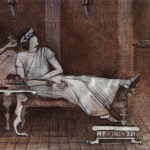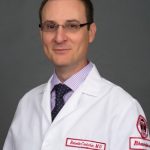Eugene Stead, Jr., MD, who was chair at Duke where I did my residency and arguably the most influential person in American medicine in the 20th century after Sir William Osler, wrote, “take care of people, not illness … the future of medicine belongs to those … who … in spite of bureaucratic systems, pressures and financial disincentives to spend time with patients continue to care for the patients as human beings.”24,25 So does the present.
This is what we’ve tried to rediscover and bring back to medicine. I think our limited observations, but most importantly the comments and actions of my former residents and faculty, and their patients, suggest that we have. This is why I sometimes read poetry, alone and with my students, residents, colleagues, and patients. And you should, too.
Dr. Panush is professor of medicine, division of rheumatology, department of medicine, Keck School of Medicine, University of Southern California, Los Angeles.
References
- Maimonides. Oath and prayer of Maimonides. Friedenwald H, trans. Bull Johns Hopkins Hosp. 1917;28:260-261.
- Cole TB. Study of hands. JAMA. 2010;304:833.
- Muller D, Kase N. Challenging traditional premedical requirements as predictors of success in medical school: The Mount Sinai School of Medicine humanities and medicine program. Acad Med. 2010;85:1378-1383.
- Ousager J, Johannessen H. Humanities in undergraduate medical education: A literature review. Acad Med. 2010;85:988-998.
- Charon R. Commentary: Calculating the contributions of humanities to medical practice—motives, methods, and metrics. Acad Med. 2010;85:935-937.
- Panush RB, Caldwell JR, Panush RS. Corot’s ‘gout’ and a ‘gipsy girl’. JAMA. 1990;204:1136-1138.
- Panush RS. Lessons and legacies from the days of the giants. Traditions of medicine and speculation about the future. In: Panush, RS, ed. Yearbook of Rheumatology and Musculoskeletal Medicine. St. Louis/Philadelphia: Elsevier; 2006:277-307.
- Panush RS, Sergent JS. A rude awakening. JAMA. 1997;277:515-516.
- Epstein AL, Stead EA Jr, Haynes BF. A way of thinking. A primer on the art of being a doctor. Carolina Academic Press, Durham, 1995. Review. Ann Intern Med. 1996;165:351.
- Verghese A. The calling. New Engl J Med. 2005;352:1844-1877.
- Lown B. The Lost Art of Healing. Ballantine, NY: Ballantine; 1996: xiii.
- Weatherall DJ. The inhumanity of medicine: Time to stop and think. BMJ. 1994;309:1671.
- Panush RS. Upon finding a Nazi anatomy atlas: The lessons of Nazi medicine. The Pharos. 1996;59:18-22.
- Panush RS. Why I no longer accept pens (or other gifts) from industry (and why you shouldn’t either). J Rheum. 2004;31:1478-1482.
- Dittrich L. The humanities and medicine: Reports of 41 U.S., Canadian, and international programs. Acad Med. 2003;78: 951-1075.
- Coller B, Klotman P, Smith LG. Professing and living the oath: Teaching medicine as a profession. Amer J Med. 2002;112:744-748.
- Charon R, Banks JT, Connelly JE, et al. Literature and medicine: Contributions to clinical practice. Ann Intern Med. 1995;122:599-606.
- Spiro H. What is empathy and can it be taught? Ann Intern Med. 1992;116:843.
- Panush RS, Parikh A, Sapru S, et al. Read two poems and call me in the morning. Humanism for residents, health care professionals, and patients. Paper presented at: Association of Program Directors in Internal Medicine Spring Meeting; April 15-19, 2007; San Diego, CA.
- Panush RS, Parikh A, Sapru S, et al. Bedside humanities improves resident performance and patient care. Comparison of a traditional curriculum enriched with bedside humanities with a traditional educational curriculum alone. A controlled innovation. Paper presented at: Association of Program Directors in Internal Medicine Spring Meeting; April 1-3, 2008; New Orleans, LA.
- Panush RS, Parikh A, Sapru S, et al. Rx: Read two poems and call me in the morning. Bedside humanities improves resident performance and patient care. Association of Program Directors in Internal Medicine Spring Meeting; April 26-29, 2009; Dallas, TX.
- Panush RS, Parikh A, Sapru S, et al. Rx: Read two poems and call me in the morning. A medical humanities curriculum improves resident performance and patient care. II. From the hospital to ambulatory care. Association of Program Directors in Internal Medicine Spring Meeting; April 26-28, 2010; Baltimore, MD.
- Fuchs E. Humanities 101: Poetry and paintings enter the residency curriculum. Reporter of Association of American Medical Colleges. November 2008.
- Chen P. Stories in the service of making a better doctor. The New York Times. October 23, 2008.
- Stead EA. Just Say For Me. Collected by F Schoonmaker and E Metz. World Press, Denver, 1969, p 13.
- Stead EA. A Way of Thinking. A Primer on the Art of Being a Doctor. BF Haynes, ed. Carolina Academic Press, Durham, 1995. Dedication


